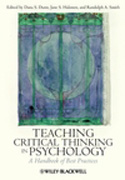
Teaching critical thinking in psychology: a handbook of best practices
Dunn, Dana S.
Teaching Critical Thinking in Psychology features current scholarship on effectively teaching critical thinking skills in psychology at the secondary and postsecondary levels. These skills include the ability to recognize patterns; to solve problems in practical, creative, or scientific ways; to engage in psychological reasoning; and to adopt different perspectives when evaluating ideasor issues. Through these skills students improve their abilities to observe, infer, develop new ideas, and analyze arguments. Written by experts in the field, this collection provides instructors with a showcase for best practices for teaching critical thinking at all levels of psychology. INDICE: Foreword. Preface. Section 1: Introduction. 01. Engaging Minds: Introducing Best Practices in Teaching Critical Thinking in Psychology. Section 2: The Case for Teaching Critical Thinking in Psychology. 02. Critical Thinking: Needed Now More Than Ever. 03. Have We Demystified Critical Thinking?. 04. Are They Ready Yet? Developmental Issues in Teaching Thinking. 05. Simple Strategies for Teaching Your Students to Think Critically. Section 3: Assessing Critical Thinking. 06. Measure for Measure: The Challenge of Assessing Critical Thinking. 07. Programmatic Assessment of Critical Thinking. 08. A Process Approach to Critical Thinking About Complex Concepts. Section 4: Critical Thinkingin Critical Psychology Courses. 09. Integrating Critical Thinking With CourseContent. 10. Critical Thinking on Contemporary Issues. 11. The Repertory Gridas a Heuristic Tool in Teaching Undergraduate Psychology. 12. Critical Thinking in Critical Courses: Principles and Applications. 13. Teaching Critical Thinking in Statistics and Research Methods. Section 5: Integrating Critical Thinking Across the Psychology Curriculum. 14. Teaching Critical Thinking Through Writing. 15. Using Service Learning to Promote Critical Thinking in the Psychology Curriculum. 16. Beyond Standard Lectures: Supporting the Development of Critical Thinking in Cognitive Psychology Courses. 17. Why We Believe: Fostering Critical Thought and Scientific Literacy in Research Methods. 18. Special Targets of Critical Thinking: Immovable Objects and Irresistible Forces. Section6: Thinking Critical Beyond the Classroom. 19. Thinking Critically About Careers in Psychology. Section 7: Critical Briefings: Short Reports on Critical Thinking. Short Report 1: Best and Worst: Learning to Think Like a Psychologist.Short Report 2: Personal Mission Statements as Tools for Developing Writing and Reflection Skills. Short Report 3: A Module-Based Research Project: Modeling Critical Thinking in Psychology. Short Report 4: Effectively Using Literature Circles in the Psychology Classroom. Short Report 5: Introducing Controversial Issues in Psychology Through Debate and Reflection. Short Report 6: The Critical Thinking Lab: Developing Student Skills Through Practical Application. Short Report 7: Encouraging Students to Think Critically About Psychotherapy: Overcoming Naive Realism. Short Report 8: Effectiveness of a Web-Based CriticalThinking Module. Short Report 9: An Introductory Exercise for Promoting Critical Thinking about Psychological Measurement. About the Editors. Author Index.Subject Index
- ISBN: 978-1-4051-7402-2
- Editorial: Blackwell
- Encuadernacion: Rústica
- Páginas: 360
- Fecha Publicación: 12/09/2008
- Nº Volúmenes: 1
- Idioma: Inglés
